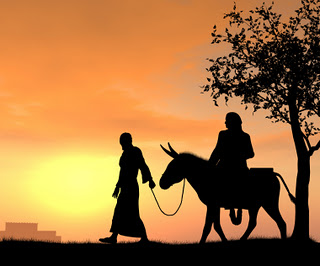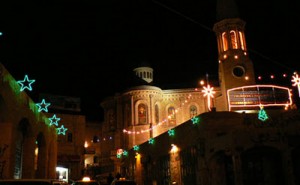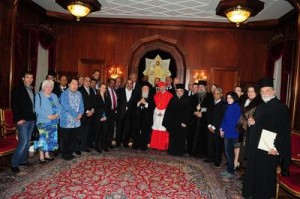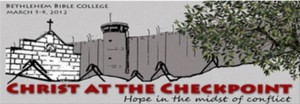A Message from Bethlehem: Voices of Hope
A Statement from an Ecumenical Delegation of Women Bishops
“We came to the land of Jesus to stand in solidarity with women working for peace. We heard their voices, listened to their stories and came away disturbed yet hopeful,” said Bishop Deborah L. Kiesey, head of a delegation of 10 ecumenical women bishops who recently traveled to Israel and Palestine.
The pilgrimage of peace and solidarity on November 12-21, 2011 was sponsored by the General Board of Church and Society of The United Methodist Church and The United Methodist Church Council of Bishops. Episcopal leaders from four denominations participated in the pilgrimage: United Methodist, Episcopal, African Methodist Episcopal and Christian Methodist Episcopal. We met with Christians, Jews and Muslims, listened to stories of despair and hope and witnessed the realities of life experienced by the people in the land.
Highlights of the pilgrimage were meeting with women throughout Israel and Palestine who are working to empower women, building bridges to new relationships and nurturing and caring for children. In Galilee we met with Arab women and Jewish women working together to empower women and build a better future in a community called Sindyanna of Galilee which teaches women how to weave baskets, make soaps and create other Fair Trade products for sale, all the while building relationships and friendships with one another.
In Nazareth we met with a Jewish rabbi who seeks through her ministry and her life to nurture diverse relationships and provide a role model for her community and her children. In the Negev, we met with Bedouin women who are building libraries including a mobile library for children in the outlying villages. They are also providing educational opportunities for women and teaching women how to do embroidery, a skill that brings them income and builds on a traditional form of art. In Jericho, we met with women at the YWCA who are offering child care and parenting support in one of the refugee camps, as well as teaching women commercial cooking skills and hairdressing. They also offer English language classes and computer courses.
All of the women we met sought to empower other women within their communities by building on their strengths, enabling them to name and address the needs of their context and making a difference in the world. These women, by their stories, challenge and inspire us as women to find ways to work for a better future for women, children and men everywhere.
Ironically, in the land where the words for peace: peace, shalom and salaam are spoken as greetings and/or farewells, this land is certainly not at peace. Bishop Sarah F. Davis, Episcopal leader in the African Methodist Episcopal denomination writes:
“If peace is to be realized anywhere, we, the people of God, can no longer be satisfied with listening to our own stories and believing only in our interpretation of the issues. Our passion for peace at home and abroad must be born out of our conviction to live as people, who, created in the image of God, understand the need to listen to the stories of others and admit there may be viewpoints on issues we have not yet seriously considered. We must pray for peace to become a universal priority of the church.”
“The beauty of the historic Holy Land remains as it must have been in biblical days – olive groves and fruit trees prolific amidst the rocky desert terrain. The realities of this land are similar, a land of promise and hope for some, and a rough and oppressive place for others,” writes Bishop Teresa Snorton with the Christian Methodist Episcopal Church.
“The Holy Land that is to embody the peace of faith and religion is also the place of almost constant war. It is hard to describe the pain, despair and oppression that is apparent in this modern Israel, which in reality is an occupied land, its ownership still in dispute.”
“The tragedy is that everyone suffers in this environment. The Palestinian people face daily indignities, injustices and experience oppression familiar to the Jim Crow South of the United Statesand apartheid ofSouth Africa. The Jewish people, in their quest to assure their covenant promise of the land, live in a constant state of fear and with the impact of an economy driven by a prevailing military presence and readiness for combat. The Church must speak to these injustices in more direct ways in the ensuing days if there is to be any possibility for an end to this conundrum that subverts rather than promotes peace for all the people for whom this is the ‘Holy’ land.”
A Pledge for Action
In addition to listening to stories, we pledged to gather facts that would equip the delegation as educators and advocates for peace upon our return to theUnited States. We recognize, as Episcopal leaders, we have the ability and responsibility to teach and preach about the critical issues of the day. Therefore, we pledge to take the following actions in our respective Episcopal areas:
- Maintain a continual discipline of prayer for the peoples of Israel and Palestine by setting aside specific day or days for prayers by our churches (a suggested time: first Wednesday of each month). During Holy Week 2012, we will urge people in our Episcopal areas to pray for the people of Israel and Palestine. Prayers will be written by our team for Holy Week and shared with the churches.
- Stand in solidarity with women in Israel and Palestine and in our communities who are working for peace.
- Identify ways our churches and country are complicit with oppression in the region.
- Organize a pilgrimage of young adults, ages 20-30, to the region in 2013 so they may anticipate similar experiences to our own. We will work with the young adults to develop a mission statement and projected outcomes.
- Implement a ministry of education by sharing our leadership and insight with our constituents.
- Speak truth to power through advocacy on justice issue related to Israel and Palestine by taking the following steps:
(A) We will invite our Council of Bishops/House of Bishops to prepare letters to President Barack Obama and respective Members of Congress regarding our observations and findings such as:
- the need to encourage political leaders to listen to and involve more women in the peace process;
- a two-state solution is essential for peace and would benefit both Israelis and Palestinians; such a solution must include:
- A sovereign, viable and contiguous Palestinian state along the 1967 borders
- Universal recognition for the state ofIsraeland protection of her security
- The sharing of the eternal city of Jerusalem as the undivided capital of two sovereign states, with universal access to the holy sites for people of all faiths;
- An end to Israeli settlements in the West Bank and East Jerusalem
- A fair solution to the problem of Palestinian refugees.
- Agreements for the equitable sharing of water resources; and
- The protection of minority rights both within the state of Israel and a future Palestinian state.
(B) Engage our respective church constituencies in dialogue and work so as to reach common ground on issues related to Israel and Palestine.
“We came to the Holy Landwhere one finds holy sites and we met living stones. We heard their stories and now want to share their stories with others in hopes of seeing all people in Israel and Palestine experience abundant life.” (Bishop Mary Ann Swenson, United Methodist Church)
A Gift to the Church
We found ourselves in Bethlehem, Jerusalem and Nazareth—all places where Jesus walked. Because we were in the Holy Landjust prior to Advent, we offer the litany below as a gift to the Church for use in local congregations during this Advent season. (Preferably this can be used on the Third Sunday in Advent, when Luke 1:46-55 is an appointed text—or any other time in Advent as desired)
The Gospel of Luke describes Mary as overshadowed by the power of God. For God, nothing is impossible! Mary responds to God, “I am your servant; let it be to me according to your word.”
It is Advent, and we wait and hope for peace and love.
WE ARE ON OUR WAY TO BETHLEHEM, WHERE JESUS WILL BE BORN.
Mary, overshadowed by God, says, “I am your servant; let it be to me according to your word.”
WE ARE ON OUR WAY TO BETHLEHEM, WHERE JESUS WILL BE BORN.
Mary and Joseph travel and arrive weary and unwelcomed.
WE ARE ON OUR WAY TO BETHLEHEM, WHERE JESUS WILL BE BORN
Bethlehem this Advent is weary and anxious in the shadow of the high dividing wall.
WE ARE ON OUR WAY TO BETHLEHEM, WHERE JESUS WILL BE BORN.
We in the world have lost our way. We need a Savior and Shepherd and Healer.
OVERSHADOW THIS WORLD, O GOD, WITH YOUR POWER AND LOVE.
Come, Lord Jesus, and bring peace in Israel and Palestine, and in every broken place.
WE PRAY FOR YOUR BIRTHPLACE AS WE MAKE OUR WAY TO BETHLEHEM.
Shatter darkness with your light as you come to gather, heal and save us.
COME, LORD JESUS, PRINCE OF PEACE.
(Litany written by Bishop Hope Morgan Ward, The United Methodist Church)
Members of the Delegation:
Bishop Laura Ahrens (The Episcopal Diocese of Connecticut)
Bishop Sarah Davis (African Methodist Episcopal Church)
Bishop Violet Fisher (United Methodist Church)
Bishop Carolyn Tyler Guidry (African Methodist Church)
Bishop Deborah Lieder Kiesey, Chair (United Methodist Church)
Bishop Vashti McKenzie (African Methodist Episcopal Church)
Bishop Jane Middleton (United Methodist Church)
Bishop Teresa E. Snorton (Christian Methodist Episcopal Church)
Bishop Mary Ann Swenson (United Methodist Church)
Bishop Hope Morgan Ward (United Methodist Church)





